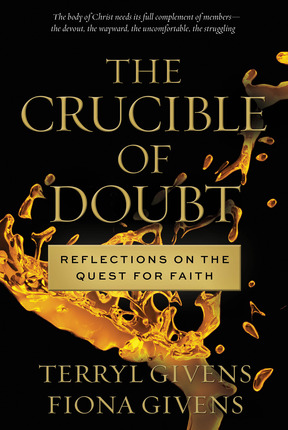If people only have time to read one chapter in The Crucible of Doubt, the book we’re discussing here on Fridays (see here and here for the first two parts of our five-part conversation), I hope chapter 5 will be that chapter.
Every religion has its shadow side, an element that, when taken to extremes, can be dangerous. For Mormons that shadow lurks in our tendency to idolize — as in actually make idols of — the men who run our church.
An idol is anything we use as a substitute for God. And I feel that sometimes, we cross that line in Mormon culture.
For example, we sometimes sing a hymn that celebrates Joseph Smith not merely as a human prophet, but as a heavenly intercessor who now mingles with deities and enjoys great glory.
That is not okay.
Through language like this we are teaching people that prophets are akin to gods, even while also trying to communicate the message that no, of course prophets are just human. The Church teaches us on the one hand that a living prophet is more valuable to us than even the scriptures (!), and instructs Primary children to follow the prophet and never “go astray.” But then it also tries to emphasize that a prophet is only a prophet “when he is acting as such,” and that not every teaching is doctrine.
In chapter 5 the Givenses point out, in far gentler and more eloquent language than I have used here, that such conundrums have been with us for a long time:
. . . in 1945, a Church magazine urged upon its readers . . . that “When our leaders speak, the thinking has been done.” Many are familiar with that expression; fewer are aware that when President George Albert Smith learned of it, he immediately and indignantly repudiated the statement. (p. 63)
And throughout this chapter and the next, on priesthood authority, they beautifully get to the heart of one of the greater dangers of idolatry, that we will surrender our own agency and growth. We are so very eager to avoid making decisions ourselves: “too often, we confuse the call to discipleship with the desire to unload responsibility for our spiritual direction onto another. Christ invites us to assume the yoke, but we would rather ride in the cart.” (p 62)
Here are some questions to get our discussion off the ground, both for our marvelous team of featured commenters and anyone else who wants to weigh in (politely):
- How might the Givenses’ view of the dangers of hero worship (ch. 5) square with the Church’s emphasis on, for example, the “Fourteen Fundamentals in Following the Prophet”?
- Is a living prophet “more vital” to us than the Scriptures? What are the spiritual blessings and dangers of such a view?
- Mormons have taught that the prophet will never lead the Church astray. Is this scriptural? Is it helpful?
- “Mormons frequently describe priesthood as the authority to act in God’s name,” the authors state. “But they often fail to plumb the potentially vexing implications of that principle.” If a church leader’s action is wrong, “are we bound to sustain the decision?”
- One of the book’s most interesting arguments is that decisions and statements made by priesthood leaders on earth can actually bind God’s will—even if they seem to be wrong. The notion is that God so deeply honors the principle of delegating authority that He will conform His will to ours, reordering whatever chaos we have created. Do you believe this? How would you relate this idea to, for example, the racial priesthood ban of Mormon history?
P.S. For next Friday, we’re reading chapters 6 and 7, with a special focus on Mormonism and other religions. Wear a special Halloween costume. Cheers.
All the posts in this series on doubt:
- Kickoff here: Mormon doubts? Let’s talk about them
- Chapters 1 & 2 discussion here: How do Mormons deal with doubt?
- Chapters 2 & 4 here: “I know the Church is true” and other Mormon muddles
- Chapters 5 & 6 here: The dangers of idolizing Mormon prophets
- Chapters 7 & 8 here: Mormonism as “the only true and living church”
- Chapters 9 to 11 here: Staying Mormon when God is silent







